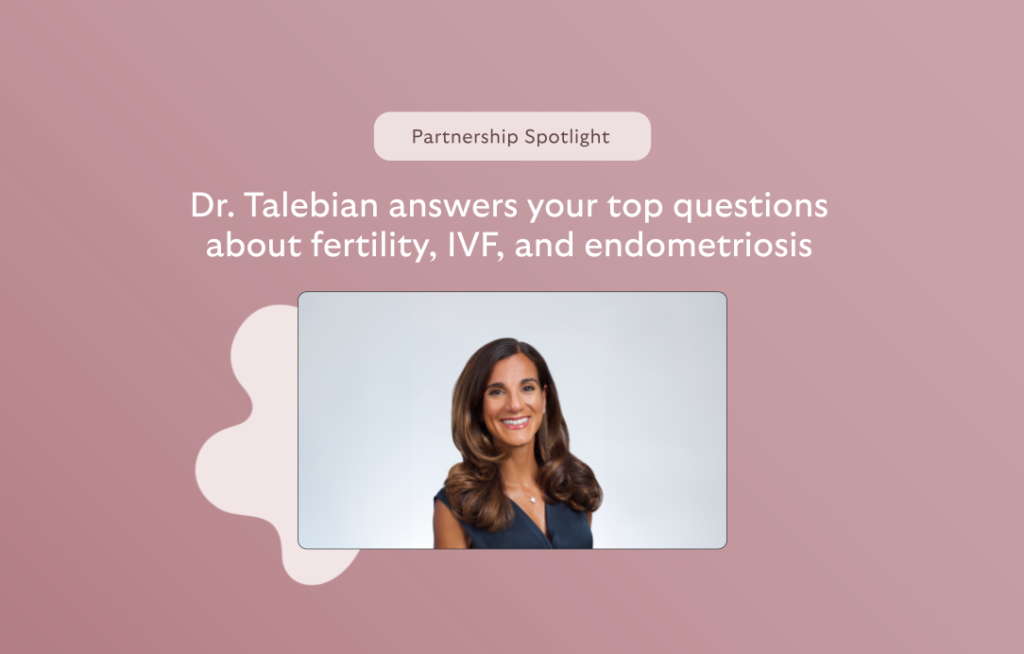Dr. Talebian answers your top questions about fertility, IVF, and endometriosis
For many patients navigating infertility, the guidance is often too simplistic: “Just do IVF.” But if you’re dealing with endometriosis—especially undiagnosed or silent forms—fertility is rarely that straightforward.
At ESSE, we know that successful outcomes require strategic, collaborative planning—not one-size-fits-all protocols. That’s why we partner with experts who understand the complexities of endometriosis and reproductive health.
We’re proud to work alongside Dr. Sheeva Talebian, board-certified reproductive endocrinologist at CCRM New York, who brings clarity, expertise, and deep empathy to the fertility process. She joined Dr. Karli Provost Goldstein for our IVF vs. Endometriosis Surgery webinar to answer the most pressing questions our patients are asking—and to help decode the real relationship between endo, IVF, and implantation.
About Dr. Sheeva Talebian
Dr. Talebian is known not only for her clinical expertise, but for how closely she listens. Her care is grounded in precision medicine, honest conversations, and a deep understanding of how endometriosis complicates fertility—especially when it’s invisible on imaging or misunderstood by traditional models.
- Board-certified reproductive endocrinologist and infertility specialist
- Partner physician at CCRM New York, one of the country’s top IVF clinics
- Over 15 years of experience in complex fertility cases, IVF, and fertility preservation
- Thought leader on unexplained infertility, silent endometriosis, and embryo implantation failure
- Known for integrative care partnerships and building thoughtful, sequenced fertility plans
Why fertility and endo need a collaborative approach
Endometriosis can impact fertility in multiple ways—not just by affecting egg quality, but also by disrupting the uterine environment and hormonal balance. And because it doesn’t always show up on imaging or cause classic pain, it’s often missed until IVF fails or embryo development stalls.
That’s why at ESSE, we don’t view surgery and IVF as “either/or.” We create care pathways in collaboration—making sure that your IVF cycles are set up for success, and that the hidden factors (like silent endo) are addressed early, not as an afterthought.
What our patients are wondering—Dr. Talebian and Dr. Goldstein answers your questions
IVF can be overwhelming. Add endometriosis into the mix, and the decisions feel even more complicated. During our webinar, Dr. Talebian and Dr. Goldstein shared clear, compassionate answers to the questions we hear most.
How does endometriosis affect fertility—even if I don’t have pain?
Dr. Talebian’s Answer: Endometriosis creates inflammation in the pelvis, even when you don’t have severe pain. That inflammation can affect egg development, embryo quality, tubal function, and uterine receptivity—all without showing up on a scan. If you’re not getting pregnant after a year of trying, it’s worth investigating further.
Should I do IVF first, or have surgery to remove endo?
Dr. Talebian’s Answer: It depends. If you’ve already tried IVF and had poor embryo quality or failed transfers, we strongly consider a surgical evaluation. In many cases, we see better-quality blastocysts and successful transfers after excision. At ESSE, we always make this decision in partnership—balancing timelines, AMH, age, and your personal goals.
Can surgery actually improve IVF outcomes?
Dr. Talebian’s Answer:Yes. Endometriosis can create a toxic inflammatory environment for your eggs and uterus. When excision surgery is done thoroughly and by a specialist, we often see improved blastocyst rates, better embryo quality, and a more receptive uterine lining for transfer.
What is the ReceptivaDx (BCL6) test and should I do it?
Dr. Talebian’s Answer: This is a uterine biopsy that screens for a marker of inflammation linked to endometriosis. It’s not a definitive test, but a high result suggests inflammation that could reduce implantation success. For patients with failed transfers or subtle symptoms, it can offer a next step—either toward surgery or medical suppression.
If I have an endometrioma, should I have it removed before IVF?
Dr. Talebian’s Answer: Not always—but often. It depends on size, location, and how it’s affecting your response. If the endometrioma is affecting your ability to access follicles or is causing pain, we often collaborate with ESSE to remove it safely, preserving as much ovarian tissue as possible.
What if I’ve already had multiple failed transfers?
Dr. Talebian’s Answer: We look deeper. Failed chromosomally normal embryo transfers are often a sign of underlying inflammation or endo. This is one of the top reasons we work so closely with ESSE—to rule out silent endometriosis and create a fresh, optimized environment for future transfers.
What if my doctor has never mentioned endometriosis?
Dr. Talebian’s Answer: That’s common—and it doesn’t mean it’s not there. Many patients with endo don’t have classic symptoms. If you have unexplained infertility, painful sex, GI changes, or failed IVF cycles, it’s worth getting another opinion. You’re not imagining it. At ESSE, we take these patterns seriously.
Why Dr. Talebian is a trusted partner at ESSE
At ESSE, we don’t believe in silos. When patients are navigating both endometriosis and fertility treatment, they deserve a team that communicates across specialties, honors timelines, and keeps the entire body in view.
Dr. Talebian shares that vision.
Together, we’ve supported hundreds of patients through IVF cycles after excision, built strategic testing plans, and created space for second opinions when “normal” results didn’t tell the whole story.
She brings the clinical wisdom—and the human touch—that our patients deserve. She knows the data, but also knows when to go deeper. That’s why she’s not just a referral partner—she’s part of your care team.












